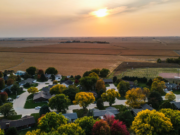| Upcoming Events: Nov. 2, 9, 16, 23: Know Your Options, Know Your Numbers, 9-10:00 a.m. CST, RSVP: https://wia.unl.edu/know Nov. 8: Young, Beginning, Small Farmer Symposium, 9 a.m.-4 p.m., UNL East Campus Union, https://ianr.unl.edu/young-beginner-and-small-farmer-symposium Nov. 12: Dr. Temple Grandin-Kids and Dreams Foundation: Understanding Animal Behavior, 10 a.m., Buffalo Co. Fairgrounds, Kearney Nov. 16: Cover Crop Grazing Field Day, 9 a.m. registration, ENREC near Mead Nov. 16: Crop Science Investigation (CSI) for youth, 4:45-5:45 p.m., RSVP to jrees2@unl.edu Nov. 19: Soil Health Summit Jan. 6: Crop Production Clinic, Mid-Plains Community College, North Platte Jan. 6-7: York Ag Expo, Holthus Convention Center, York Jan. 11: Crop Production Clinic, Northeast Community College, Norfolk Jan. 13: Crop Production Clinic, Holiday Inn Express, Beatrice Jan. 19: Crop Production Clinic, C3 Hotel & Convention Center, Hastings Jan. 21: Crop Production Clinic, ENREC near Ithaca Jan. 25-26: No-till on the Plains Winter Conference, Wichita, KS, http://www.notill.org/upcoming-events Jan. 25: Crop Production Clinic, Younes, Kearney Jan. 26: Crop Production Clinic, Holthus Convention Center, York Feb. 17: Nebraska On-Farm Research Updates, York |
It’s been a very nice fall with gorgeous colors on the trees the past month! It’s also hard to believe tomorrow is Nov. 1. While there’s a Nov. 1 date for fall anhydrous application in area NRDs, we also recommend watching soil temperatures and apply when soil temperatures are 50F or lower. This is because nitrifying bacteria slow due to the cool temperatures and by 40F, the process of nitrification is near zero. Nitrifying bacteria are ones that, through a biological process called nitrification, convert ammonium to nitrate. They multiply and complete this nitrogen conversion quickest in warmer soil temperatures (low to mid-80’s). The cooler weather this week will help continue to drive soil temperatures down. At time of writing this, they’re setting at 49F at the 4” depth for last week in the York area. You can view daily and weekly average soil temperatures at: https://cropwatch.unl.edu/soiltemperature. Also, a quick plug to consider an N rate study this coming year. It’s fairly easy to do…apply your current rate in one pass, compare that to 30 or 50 lbs. under the next pass, and alternate it across the field. For example, if you had a 16 row applicator and an 8 row combine, each harvest pass then becomes a comparison to the rate next to it (paired comparison) for on-farm research. You could also do 3 treatments comparing the same amount over and under your current rate using this protocol. A number of protocols have been updated at: https://cropwatch.unl.edu/farmresearch/extensionprotocols.
With cooler temps, it’s also important to safely graze frosted sorghum species. More info here: https://go.unl.edu/d8kv.
Young, Beginning, Small Farmer Symposium will be held Nov. 8 from 9 a.m.-4 p.m. at UNL’s East Campus Union in Lincoln. The event will also be livestreamed. There is no charge and lunch and parking will be provided. The event will be structured as a series of panel discussions. Audience members will hear from farmers who are getting started in both traditional and non-traditional operations. They’ll also hear about financial and risk management resources available to farmers as they grow their operations. To register or watch the livestream, go to: https://ianr.unl.edu/young-beginner-and-small-farmer-symposium.
Flyers for both the events I mention next are found at https://jenreesources.com. On November 8-11, there’s a Holistic Management Workshop held in different locations throughout the State. On November 12 is an opportunity for youth and families to hear about animal behavior from Dr. Temple Grandin at 10 a.m. at the Buffalo County Fairgrounds in Kearney. Dr. Grandin brings awareness about autism and its relation to animals. She also will be the keynote speaker for the Kids and Dreams Autism Conference: http://www.kidsanddreams.org/.
Crop Input and Cost of Production Workshops will be held Nov. 9-11 in Hastings, Beatrice and the Mead area, which includes a virtual option for producers from across the state to join. Crops and agricultural economics extension educators will cover the forces that are driving input costs and commodity prices, discuss fertilizer recommendations based on soil test results, and provide information on preparing cost of production budgets. Attendees are welcome to bring their latest soil tests. Registration is required at: 402-472-1742 or https://cap.unl.edu/crop-input-and-cost-production-workshop-registration. The workshops will be held from 2 to 4 p.m. at the following locations:
- Tuesday, Nov. 9 in Hastings at the Community Services Building on the Adams County Fairgrounds, 947 S. Baltimore Ave.
- Wednesday, Nov. 10 in Beatrice at the Gage County Extension Office, 1115 W. Scott St.
- Thursday, Nov. 11 near Mead at the Eastern Nebraska Research, Extension and Education Center, 1071 County Road G., Ithaca, Nebraska. (Face coverings required.) (Livestream option available for Nov. 11. Register here to receive the Zoom link.)
Cover Crop Grazing Conference will be held Nov. 16 at the Eastern Nebraska Research, Extension and Education Center near Mead. The conference kicks off with registration, refreshments and a trade show at 9 a.m. at the August N. Christenson Building. Educational programs are from 10 a.m.-3:30 p.m. and include a producer panel session, small group discussion and a live field demonstration. Featured presentations include “Early and Late Season Grazing of Cover Crops” with Dr. Mary Drewnoski and “2022 Cash Rent and Flex Lease Arrangements” presented by Jim Jansen. Registration is $10 and can be paid at the conference via cash or check. Please pre-register at: https://extension.unl.edu/statewide/enre/2021-cover-crop-grazing-conference/


































